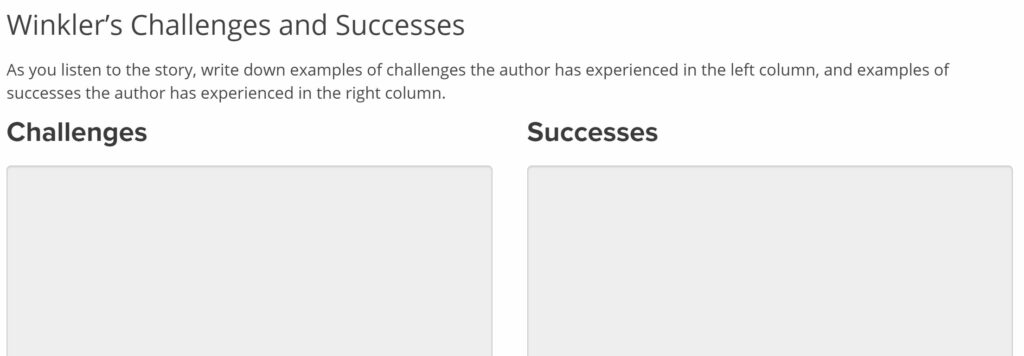Last Updated on August 22, 2024
Summer break is coming to an end, and soon you’ll be teaching a room of students who haven’t been in the classroom in months. Don’t let learning loss send you into a panic — we can help! Listenwise has a huge library of high-interest podcast and video lessons that can be used in multiple ways to help get your students back on track.
We’ve compiled a list of instructional ideas to help make up for learning loss over the past few months. We hope that the list below will help you feel confident that you are using our podcasts in the most effective ways to support your students’ learning goals.
1) Teach with Podcasts in Small-Group Intervention
The flexibility of Listenwise’s instructional framework makes it a great resource for whole class and small group intervention.
Find the right fit for your lesson plans faster with our new-and-improved search and filter tools. Now you can search by story length and type, grade level, subject, topics, and ELP band.
Searching by story length allows you to plan to gradually increase the complexity level of the stories students hear over time. Embedded quizzes for frequent formative assessments, which provide valuable data to track student progress toward learning goals. These auto-scored multiple-choice quizzes measure comprehension skills and offer a good opportunity to develop literacy across domains. These skills include recognizing literal meaning, identifying the main idea, making inferences, and understanding vocabulary in context.
Listenwise is a beneficial addition to my curriculum. We can listen and respond whole group before students write individually and students can log in and work at their own pace. Nice variety of subjects and good academic vocabulary!
High School ELD Teacher, School District of Philadelphia
2) Use Podcasts as Audio Texts to Support Literacy Skill Development
Many educators who use Listenwise view our podcasts as audio texts that pair well with popular literacy strategies. Using podcasts as texts provides equitable access to students who struggle to read, as they may be more easily able to acquire information, build vocabulary, and practice critical thinking and literacy skills through audio rather than print.
Our quick Listenwise Sticky Notes episodes explain how educators can pair Kylene Beer’s popular Plot Relationship Chart for summarizing stories and her Contrast and Contradiction strategy for making inferences with weird news.
Using Listenwise Premium standards-aligned lessons is another simple way to support close reading and listening skills. Every standards-aligned lesson includes a listening organizer in the teacher’s guide that students can use to take notes as they listen and/or follow along with the interactive transcript.
Listenwise challenges students to pay attention, listen and use strategies that help make them successful in completing assignments such as previewing, setting up quiet work areas, looking for context, referencing prior-knowledge and really thinking about what they are hearing.
Middle School ELD Teacher, Massachusetts
3) Cultivate Student Agency With Effective Supports
Our podcasts’ built-in-scaffolds can empower students to make choices that personalize their own learning experiences at appropriate times. For example, students may choose to slow down the audio while they listen, listen a second time to a particular part of a story, or read along with the interactive transcript.
Students also have access to the text-help toolbar. The toolbar can define selected words from the transcript or questions with written, spoken, or picture definitions and pronounce words, phrases, or paragraphs in English and Spanish. These built-in scaffolds may help students form habits that will benefit students throughout their literate lives, including if they have similar accommodations on high-stakes online assessments.
4) Reach Students With Relevant Topics
We curate podcasts on topics of high interest to students, but we suggest educators browse for podcasts on topics that are most engaging for their students and relevant to their lives.
Educators can support student agency and engagement by offering students structured choice (see strategies provided in this blog post) to select podcasts that interest them within a particular instructional frame. Research indicates that instructional materials that reflect and validate students’ personal identities and experiences are critical for deep, meaningful learning. The deeper the learning, the greater the strides towards combatting leaning loss.
A curated selection engaging topics:
- Taxing Cow and Sheep Burps
- Animals Display Emotions
- Why Fear is Fun
- The First Cities
- Inclusive Video Gaming
- Weird News: Pet Unicorn
- Debate: Should Kids Go to School All Year Round?
- Birds are Dinosaurs
High interest ELD lessons:
- Big Eared Bats (gen ed & ELD versions available)
- Whale Hit Songs (gen ed & ELD versions available)
- Mayans and the History of Chocolate (gen ed & ELD versions available)
- Immigrant Experience (gen ed & ELD versions available)





